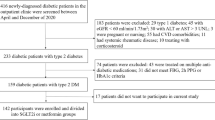Abstract
Diabetic patients have a markedly increased risk of cardiovascular disease compared with non-diabetics. Two drug groups today target insulin resistance; biguanides and thiazolidinediones. In addition, these may have other effects on cardiovascular risk factors. The aim of this study was to evaluate the effects of metformin and rosiglitazone on non-traditional cardiovascular risk factors. Forty type 2 diabetic patients were randomized into metformin and rosiglitazone groups. After receiving the optimal doses, the patients were monitored for 12 weeks. Biochemical parameters, lipid parameters, CRP, insulin, c-peptide, and HbA1c levels were analyzed. VWF, PAI-1, ICAM-1, TNF-α, IL-6, E-selectin, and fibrinogen levels were measured in order to assess coagulation status and endothelial dysfunction. In the metformin group, body mass index, PPG, HbA1c, IL-6, ICAM-1, and TNF-α levels were significantly decreased after 12 weeks compared with the basal levels. IL-6 levels decreased from 75 pg/ml ± 20 to 42 pg/ml ± 9 (P 0.023) and TNF- α levels from 61 pg/ml ± 31 to 39 pg/ml ± 10 (P 0.018). In the rosiglitazone group, FPG, PPG, HbA1c, insulin, HOMA-IR, IL-6, and TNF-α levels decreased significantly after 12 weeks compared with the basal levels. IL-6 levels decreased from 78 pg/ml ± 21 to 41 pg/ml ± 9 (P 0.028) and TNF-α levels from 62 pg/ml ± 19 to 37 pg/ml ± 10 (P 0.012). At the end of the study, no significant differences were determined between groups. Insulin resistance and type 2 diabetes are strongly associated with low grade inflammation. Both metformin and rosiglitazone were effective in controlling inflammatory markers in addition to metabolic parameters.


Similar content being viewed by others
References
Fonseca VA (2003) Management of diabetes mellitus and insulin resistance in patients with cardiovascular disease. Am J Cardiol 92(4A):50J–60J
Vijay SK, Mishra M, Kumar H, Tripathi K (2009) Effect of pioglitazone and rosiglitazone on mediators of endothelial dysfunction, markers of angiogenesis and inflammatory cytokines in type-2 diabetes. Acta Diabetol 46:27–33
Bailey CJ (1999) Insulin resistance and antidiabetic drugs. Biochem Pharmacol 58(10):1511–1520
Rosenberg DE, Jabbour SA, Goldstein BJ (2005) Insulin resistance, diabetes and cardiovascular risk: approaches to treatment. Diabetes Obes Metab 7(6):642–653
UK Prospective Diabetes Study (UKPDS) Group (1998) Effect of intensive blood-glucose control with metformin on complications in overweight patients with type 2 diabetes (UKPDS 34). Lancet 352(9131):854–865
Taniguchi A, Fukushima M, Sakai M, Miwa K, Makita T, Nagata I et al (2000) Remnant-like particle cholesterol, triglycerides, and insulin resistance in nonobese Japanese type 2 diabetic patients. Diabetes Care 23:1766–1769
McAuley KA, Williams SM, Mann JI, Walker RJ, Lewis-Barned NJ, Temple LA, Duncan AW (2001) Diagnosing insulin resistance in the general population. Diabetes Care 24(3):460–464
De Jager J, Kooy A, Lehert P, Bets D, Wulffelé MG, Teerlink T, Scheffer PG, Schalkwijk CG, Donker AJ, Stehouwer CD (2005) Effects of short-term treatment with metformin on markers of endothelial function and inflammatory activity in type 2 diabetes mellitus: a randomized, placebo-controlled trial. Intern Med 257(1):100–109
Esposito K, Ciotola M, Carleo D, Schisano B, Saccomanno F, Sasso FC, Cozzolino D, Assaloni R, Merante D, Ceriello A, Giugliano D (2006) Effect of rosiglitazone on endothelial function and inflammatory markers in patients with the metabolic syndrome. Diabetes Care 29(5):1071–1076
Samaha FF, Szapary PO, Iqbal N, Williams MM, Bloedon LT, Kochar A, Wolfe ML, Rader DJ (2006) effects of rosiglitazone on lipids, adipokines and inflammatory markers in nondiabetic patients with low high-density lipoprotein cholesterol and metabolic syndrome. Arterioscler Thromb Vasc Biol 26:624–630
Kim HJ, Kang ES, Kim DJ, Kim SH, Ahn CW, Cha BS, Nam M, Chung CH, Lee KW, Nam CM, Lee HC (2007) Effects of rosiglitazone and metformin on inflammatory markers and adipokines: decrease in interleukin-18 is an independent factor for the improvement of homeostasis model assessment-beta in type 2 diabetes mellitus. Clin Endocrinol 66:282–289
Taniguchi A, Fukushima M, Nakai Y, Kuroe A, Yamano G, Yanagawa T, Ohgushi M, Ohya M, Yoshii S, Taki Y, Seino Y (2005) Soluble E-selectin, leptin, triglycerides, and insulin resistance in nonobese Japanese type 2 diabetic patients. Metabolism 54(3):376–380
Abbasi F, Chu JW, McLaughlin T, Lamendola C, Leary ET, Reaven GM (2004) Effect of metformin treatment on multiple cardiovascular disease risk factors in patients with type 2 diabetes mellitus. Metabolism 53(2):159–164
Sınger G, Granger DN (2007) Inflammatory responses underlying the microvascular dsyfunction associated with obesity and insulin resistance. Microcirculation 14:375–387
Nerla R, Pitocco D, Zaccardi F, Scalone G, Coviello I et al (2010) Effect of pioglitazone on systemic inflammation is independent of metabolic control and cardiac autonomic function in patients with type 2 diabetes. Acta Diabetol 47(supp 1):117–122
Nissen SE, Wolski K (2007) Effect of rosiglitazone on the risk of myocardial infarction and death from cardiovascular causes. N Engl J Med 356(24):2457–2471
Home PD, Pocock JS, Gomis R, Hanefeld M, Jones NP, Komajda M, McMurray J (2007) Rosiglitazone evaluated for cardiovascular outcomes—an interm analysis. N Engl J Med 357:28–38
Home PD, Pocock SJ, Beck-Nielsen H, Curtis PS, Gomis R, Hanefeld M, Jones NP, Komajda M, McMurray JJ, RECORD Study Team (2009) Rosiglitazone evaluated for cardiovascular outcomes in oral agent combination therapy for type 2 diabetes (RECORD): a multicentre, randomised, open-label trial. Lancet 373(9681):2125–2135
Pantalone KM, Kattan MW, Yu C, Wells BJ, Arrigain S, Jain A, Atreja A, Zimmerman RS (2009) The risk of developing coronary artery disease or congestive heart failure, and overall mortality, in type 2 diabetic patients receiving rosiglitazone, pioglitazone, metformin, or sulfonylureas: a retrospective analysis. Acta Diabetol 46(2):145–154
Author information
Authors and Affiliations
Corresponding author
Rights and permissions
About this article
Cite this article
Fidan, E., Onder Ersoz, H., Yilmaz, M. et al. The effects of rosiglitazone and metformin on inflammation and endothelial dysfunction in patients with type 2 diabetes mellitus. Acta Diabetol 48, 297–302 (2011). https://doi.org/10.1007/s00592-011-0276-y
Received:
Accepted:
Published:
Issue Date:
DOI: https://doi.org/10.1007/s00592-011-0276-y




